Floyd|Snider recently held a company retreat at the Whidbey Institute, which included a service component with our staff on the land. From the Whidbey Institute staff perspective, the day was an incredible example of volunteerism done well.
The friendship between our two organizations runs deep—Floyd|Snider has had a longstanding tradition of supporting employee participation in Powers of Leadership, and Kate Snider, founding principal, is the current Whidbey Institute Board President. I had the opportunity last week to talk with Jessi Massingale, a Floyd|Snider Principal with an oceanography and engineering background, about her team’s experience on the land. Here’s that conversation. —Marnie Jackson
Marnie: Can you tell me more about Floyd|Snider?
Jessi: Floyd|Snider is a Seattle-based environmental consulting firm, and we just celebrated our 20-year anniversary. Since our founding in 1996, our company mission has been to provide comprehensive consulting services to help our clients achieve their objectives. We work primarily with contaminated upland and aquatic properties. We assemble and manage strong project teams with a mix of staff such as environmental scientists, engineers, geologists, chemists, project managers, and assistants and value working in a creative and collaborative environment within our company as well as within the greater community. For most of our projects, we team with other firms.
I understand you’re seeking B Corp and Social Purpose Corporation (SPC) status. Can you tell me more about what this means for you?
Decision-making at Floyd|Snider has always been collaborative, whether it’s about issues affecting our employees or about the type of projects we pursue or clients we work for. We’ve always had a socially-responsible overlay in our decision-making, and this was a natural next step for us. We want a degree of transparency and certification that shows our commitment to how we do business, and how we have done business for 20 years. We’ve filed with the State of Washington to become an SPC and we’re in the middle of a comprehensive assessment process on the way to becoming a B Corp. The assessment measures how we’re meeting standards for environmental and social performance, accountability, and transparency. Both labels are a great fit for us, and a way to solidify our commitment to being a socially responsible business.
You helped us out during your recent team retreat at the Whidbey Institute, providing an afternoon of service on the land. Can you tell me more how that fit with your company’s goals and values?
Volunteerism is a longstanding part of our company culture. Since 2009, we’ve had a program to promote community environmental stewardship. We give our employees a week of paid time off each year to use in service to the non-profit of their choice, which has resulted in more than 1400 hours of volunteer time in our community over eight years. Our staff has engaged and added value to a range of other organizations—in addition to the Whidbey Institute, we’ve served Bikeworks, Columbia Land Trust, and Cedar River Watershed Education Center to name just a few.
A few years ago we had a company retreat at IslandWood on Bainbridge. They have a wonderful garden for educational outreach and cooking onsite. We connected with their master gardener and spent half a day getting their garden ready for spring and summer. It added value to our company retreat, giving us a chance to talk about our company while collaborating on a project like that. It set the precedent for continued service work during our company retreats. This year, during our retreat at the Whidbey Institute, we helped Land Steward Rob Mellinger clear out the understory of the forested cabin area, opening up walking trails and removing branches and debris to help some of the native plants throughout that area thrive.
We worked with the Whidbey Institute staff and had a lot of fun. It was great to have 30 people descend on an area for a couple hours, and to see how much you can accomplish when you work together. Additionally, the quality of our team retreat was really supported by the service component. We were able to enjoy fruitful discussions in Thomas Berry Hall then step out, get some fresh air, chat, work, and see a clear outcome at the end of our time together.
Because we’re an environmental consulting firm, our team members have a natural inclination to working in hands-on, beneficial outdoor activities.
The Whidbey Institute is so unbelievably beautiful, just being there feels invigorating and refreshing. I’ve been there with our company and I’ve also been lucky enough to spend time there with Powers of Leadership. Service on the land gave me another way to enjoy social time on the land. Those types of hands-on, out-of-office opportunities are valuable for organically growing a sense of community, an appreciation for what it means to work for good.
How does Floyd|Snider’s commitment to social and environmental values fit in the greater cultural landscape?
I’ve been thinking about how values change from one generation to the next. In my parents’ generation, it might have been enough to find good, steady employment. The upcoming generation wants an extra level of meaning in their work. Young people today are defining and measuring success and value in a different, more complex way. By clarifying who we are as a company and how we make our decisions, we at Floyd|Snider hope to engage this new generation of leaders. They demonstrate the kind of leadership that requires self-reflection:
“Why are you where you are? Why do you want to commit and be part of this firm?” I know from personal experience that it feels great to say, “what I am a part of and how I make my income is aligned with my values. I have a positive impact and make a positive contribution to something bigger than myself.”
There are over 1600 certified B Corps in over 42 countries—over 1600 companies that have said, “we want to use our business for good.” That’s exciting, and that gives me hope for the future.

